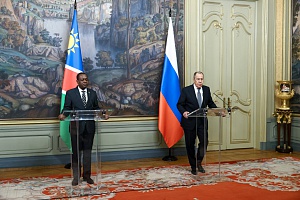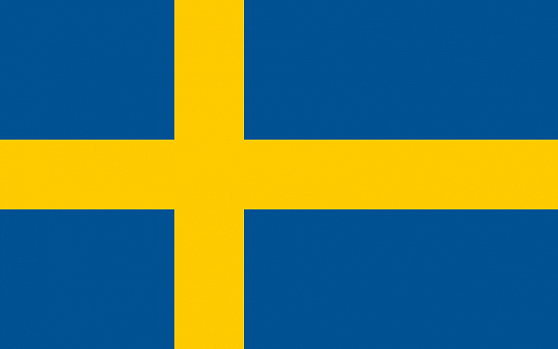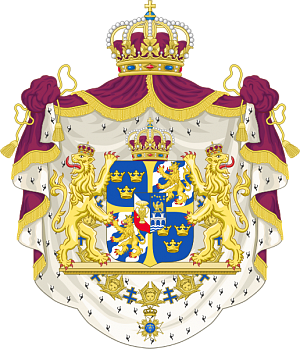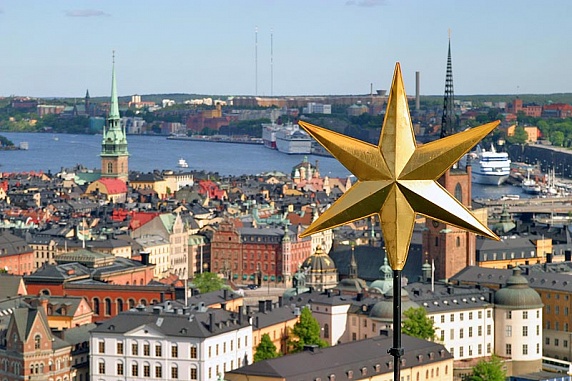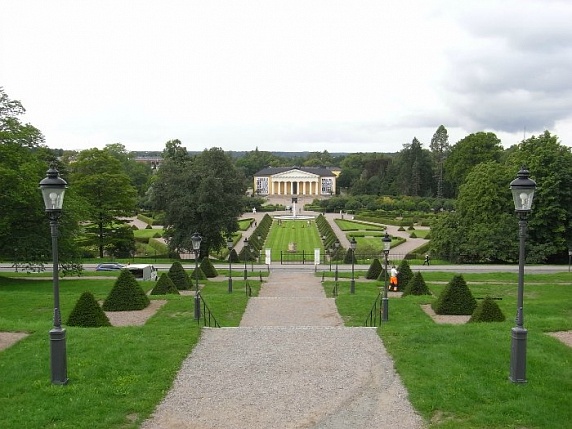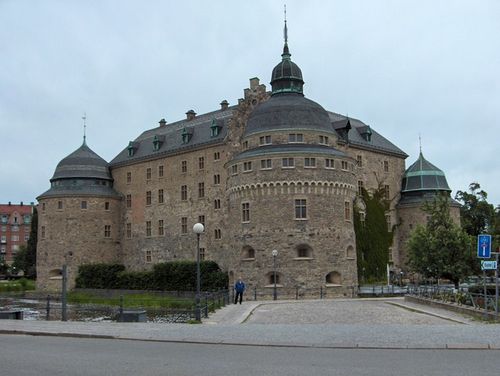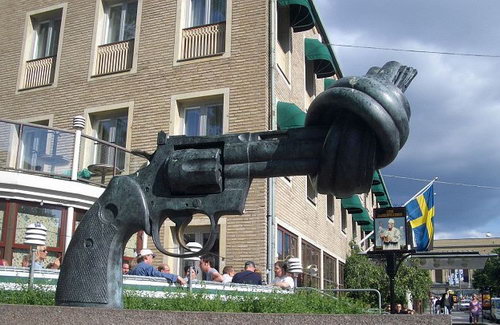 Королевство Швеция
Королевство Швеция
Foreign Minister Sergey Lavrov’s statement and answers to media questions at a joint news conference following talks with the Minister of International Relations and Cooperation of the Republic of Namibia Peya Mushelenga, Moscow, March 26, 2024
Ladies and gentlemen,
Minister of International Relations and Cooperation of the Republic of Namibia Peya Mushelenga and I have had substantive and productive talks. This is the minister’s first visit to our country in this new capacity. Previously he visited Russia holding other positions in the Namibian government.
We agreed that bilateral ties going back to the uncompromising struggle of the Namibian people for self-determination are expanding and rooted in friendship and mutual affection between our peoples. March 2025 will mark the 35th anniversary of diplomatic relations which were established on the day Namibia’s independence was proclaimed.
We are satisfied with the level of political dialogue between our countries. We maintain regular contacts, and our dialogue is expanding into new areas. We welcomed the stepped-up contacts between the parliaments and parties of the two countries, as well as the intensified exchanges between ministries and agencies, including the foreign ministries, which rely on the foundation of the long-standing and well-functioning plan of consultations.
Unfortunately, bilateral trade remains quite modest. Today, we have shown mutual interest in expanding trade and implementing investment projects which the Intergovernmental Commission on Trade and Economic Cooperation will work to promote. My counterpart co-chairs it from the Namibian side and Deputy Prime Minister Yury Trutnev co-chairs it from the Russian side. The 10th meeting of the Intergovernmental Commission will be held in Moscow on March 27, and we look forward to it producing new important decisions.
We noted that geological prospecting, extraction and processing of mineral resources (including uranium and diamonds), energy, the agricultural industry, fishing, public health, personnel training, culture, tourism and sports top the list of the most promising areas of cooperation. There are many other promising areas in which we can expand our cooperation. We also agreed to step up joint work to finalise the language of a number of draft intergovernmental and interagency documents.
We exchanged views on international political priorities. Our positions overlap on all key issues. Just like Namibia, Russia supports the democratisation of international relations and building them atop the UN Charter provisions and principles in their entirety and interrelation, without the attempts to interpret the Charter depending on the circumstances as our Western “colleagues” choose to do. Such actions are very typical of them.
We discussed the need to reform the UN and its Security Council. For our part, we reaffirmed our unwavering position where the legitimate interests of the African countries should be fully taken into account in these processes.
We appreciate Namibia’s solidarity with a number of Russia’s initiatives in the UN, including the resolution on combating the glorification of Nazism, outer space and disarmament matters, and cyber security. We support each other’s candidates during elections to various UN bodies.
We prioritised regional issues, focusing primarily on the situation in the Southern African Development Community with an emphasis on the hotbeds of tension in eastern Democratic Republic of Congo and northern Mozambique. We expressed our appreciation and praised the proactive and productive role played by Namibia to promote these efforts.
Russia believes that strengthening the sovereignty of African countries is important. We reaffirmed our position on the importance of everyone adhering to the principle of African solutions to African problems. The international community should assist Africans in every way, including by planning and equipping peacekeeping operations and by funding projects. That position of ours has been reiterated today. The African Union, the Southern African Development Community and other sub-regional African organisations have an important role to play in promoting this approach.
We recognised our mutual commitment to step up Russia-SADC cooperation. We have a Memorandum of Understanding signed by the Government of the Russian Federation and the Community on the foundations of relations and cooperation.
We discussed prospects for expanding cooperation within the Russia-Africa Partnership Forum. Namibia participated in the first Russia-Africa Summit in 2019 and the second summit that took place in St Petersburg in 2023. Following the decision adopted at the St Petersburg summit, a Russia-Africa meeting at the level of foreign ministers will be held in Russia in November. We look forward to our Namibian friends accepting our invitation.
I would like to take this opportunity to reiterate that we view growing cooperation with Africa and the Southern African Development Community through the prism of strengthening the foundations of the emerging polycentric order. We are undertaking similar efforts and will intensify them with regard to other regional and subregional civilisational centres in the Global South and Global East, including ASEAN and CELAC.
We exchanged views on the state of affairs in the Middle East in the context of the sharp escalation of the Palestinian-Israeli conflict, as well as massive, unjustified and illegal strikes by the “international coalition” led by the United States and Great Britain in Yemen.
We touched upon the situation in and around Ukraine. I apprised our colleagues of the Russian Federation’s current views on the status of the special military operation to resolve the conflict provoked by the collective West (no one has any doubt left about this) in order to hold our country back. We are grateful to our friends in Namibia for their balanced position on this issue which they invariably adopt at the UN whenever this issue comes under discussion.
We are now convinced that our friends understand the design behind the initiative to hold a “peace summit.” The West seeks to base it on Zelensky’s non-starter “peace formula” and use it as an ultimatum. It will lead nowhere, and the overwhelming majority of the countries that the West and Kiev invite to such sit-downs are aware of this.
I believe the talks were productive, for which I am grateful to my colleague.
Question: Does Russia plan to engage the specialised UN agencies and other international organisations dealing with counter-terrorism after the terrorist attack in Crocus City Hall on March 22?
Sergey Lavrov: I would like to point out the following circumstances.
We have started our own fairly effective and prompt investigation, which brings new facts every day. They will be summed up by the Investigative Committee, the Prosecutor General’s Office and other competent bodies of the Russian Federation.
Notably, the next day after the terrorist attack, when the West stated it was not Ukraine but the Islamic State, Interpol suddenly said they would be willing to assist in the investigation.
I don’t remember Interpol ever coming up with such an initiative before in cases that called for close international scrutiny as well, of which the Nord Stream pipelines are the most striking examples. No one volunteered to help us investigate the bombing of the pipelines. Moreover, the countries whose waters the two Nord Stream pipelines crossed (Sweden, Denmark, and Germany) said they would figure it out on their own. We contacted the UN Security Council several times urging it to adopt a completely depoliticised resolution to hold a transparent international investigation. Our proposal was turned down outright. When we spoke about holding the perpetrators accountable based on the results of such a probe, this particular phrase was blocked by the Americans and the British.
On the one hand, I am certain we will cope with this investigation. On the other hand, it is unlikely that we will ever need anyone’s assistance that is clearly based on double standards which, most likely, will prioritise the theory that is convenient for the West that the Islamic State did it, and Ukraine had “nothing to do with it.” We can handle it ourselves. We have long been accustomed to double standards practiced by our Western friends. From now on, we will be guided solely by our clear understanding of what the West is trying to achieve and what methods it plans to use in the process.
